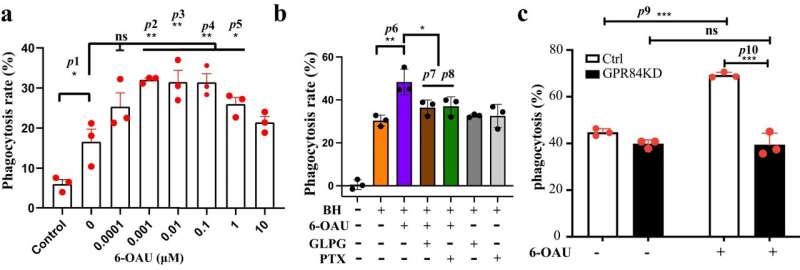This article has been reviewed according to Science X's editorial process and policies. Editors have highlighted the following attributes while ensuring the content's credibility:
fact-checked
peer-reviewed publication
proofread
Research reveals pro-phagocytic function and structural basis of GPR84 signaling

A recent study, published in Nature Communications, focuses on the interaction between free fatty acids (FFAs) and GPR84, a G protein-coupled receptor (GPCR).
FFAs, generated from triglycerides during lipolysis, play a crucial role in signaling through GPCRs in metabolic, inflammatory, and immune processes. GPR84, classified as an A-class GPCR and coupled to the downstream Gi pathway, has been identified as a receptor that may recognize endogenous medium-chain fatty acids (MCFAs), distinguishing them from short-chain fatty acids (SCFAs) or long-chain fatty acids (LCFAs).
GPR84 is predominantly expressed in peripheral immune cells, such as monocytes, macrophages, and neutrophils. Its expression is strongly upregulated under inflammatory conditions, indicating its potential involvement in inflammatory responses. Previous studies have suggested that GPR84 signaling has pro-inflammatory functions and has become a potential drug target for treating inflammatory and fibrotic diseases.
Of particular interest is GPR84's role in immune functions, specifically in promoting macrophage phagocytosis. Analysis of human tumor RNA sequencing data reveals the specific expression of GPR84 in tumor-associated macrophages (TAMs). The data strongly suggest that the GPR84-Gi signaling axis plays a crucial role in mediating the phagocytic activities of macrophages, especially TAMs, against cancer cells.
Blocking these signals by disrupting the interaction with receptors expressed on macrophages triggers the phagocytosis of cancer cells, showing promising anti-cancer effects in mouse cancer models and clinical trials.
To explore the therapeutic potential of activating GPR84 signaling in cancer, researchers tested the synthetic GPR84 agonist 6-OAU in combination with an anti-CD47 antibody. The results demonstrated that the activation of the GPR84-Gi signaling axis, coupled with the disruption of the CD47 interaction, synergistically induced the phagocytosis of cancer cells by macrophages.
Structural analysis using cryo-electron microscopy revealed a high-resolution structure of the GPR84-Gi signaling complex with 6-OAU. The structure provides insights into the lipid recognition by GPR84 and the mechanism of receptor activation. This breakthrough opens new avenues for understanding GPR84 signaling and developing potential drug candidates for cancer and other inflammatory diseases.
Although two drugs, PBI-4050 and GLPG1205, targeting GPR84, have been tested in clinical trials for treating pulmonary fibrosis, no significant therapeutic efficacy has been reported so far. The current study, with its detailed structural insights, offers a foundation for future drug development targeting GPR84, presenting a hopeful prospect for cancer treatment and other inflammatory conditions.
The research team was led by Prof. Gong Weimin from the University of Science and Technology of China (USTC) of the Chinese Academy of Sciences (CAS), in collaboration with researchers from the University of Pittsburgh, the Singapore Agency for Science, Technology and Research, City of Hope Comprehensive Cancer Center, and the University of Glasgow.
More information: Xuan Zhang et al, Pro-phagocytic function and structural basis of GPR84 signaling, Nature Communications (2023). DOI: 10.1038/s41467-023-41201-0


















